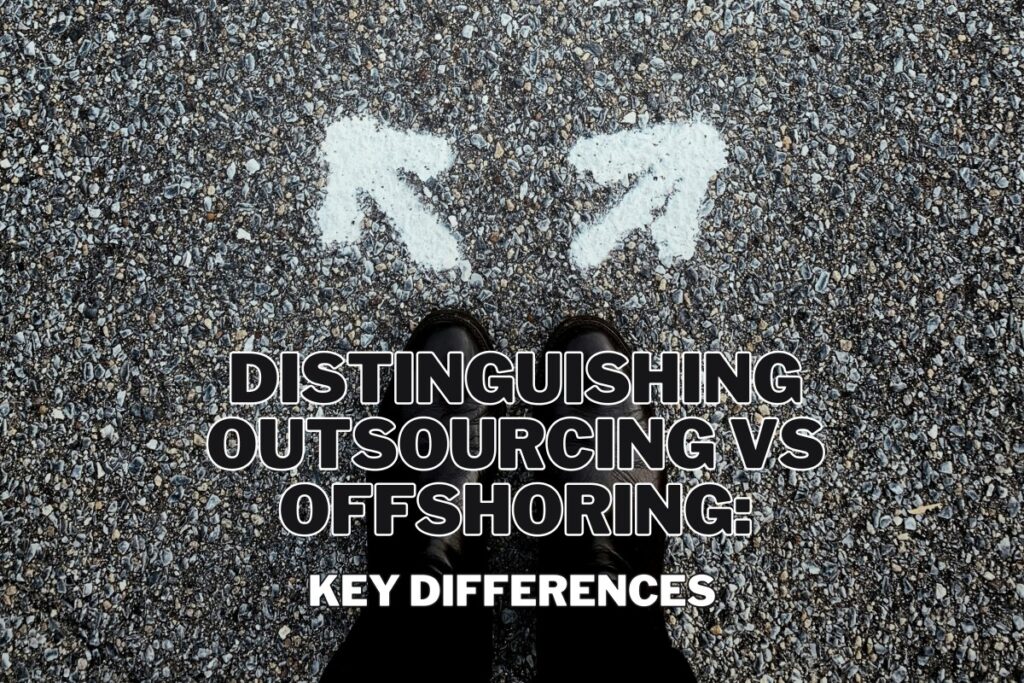In this comprehensive article, I’ll provide a detailed overview of both concepts, explore the factors to consider when choosing between outsourcing and offshoring, delve into the benefits of offshore outsourcing, discuss business processing outsourcing (BPO), and provide examples of outsourcing in various industries.

Outsourcing vs offshoring
Outsourcing refers to the practice of contracting out specific business functions or processes to external service providers. This can include tasks such as customer service, IT support, manufacturing, and more.
Offshoring, on the other hand, involves relocating business operations or processes to a different country, typically one with lower labor costs or other strategic advantages.
Additionally, I’ll examine the differences between employing people directly versus outsourcing tasks to non-employees.
Factors to Consider When Choosing Between Outsourcing and Offshoring
When it comes to outsourcing vs. offshoring, the decision often hinges on various factors, including the nature of the tasks, cost considerations, regulatory requirements, and geographic advantages.
For example, suppose a company needs to outsource its customer service operations to a third-party provider. In that case, outsourcing may be the preferred option, allowing the company to access specialized skills and expertise without the need to invest in additional resources or infrastructure.
By outsourcing customer service, the company can focus on its core competencies while relying on external experts to handle customer inquiries and support.
On the other hand, suppose a company operates a manufacturing facility and is looking to reduce production costs. In that case, offshoring may offer greater cost savings and operational efficiencies.
By relocating manufacturing operations to a country with lower labor costs or other strategic advantages, such as access to raw materials or proximity to key markets, the company can achieve significant cost savings while maintaining production quality and efficiency.
Benefits of Offshore Outsourcing
Offshore outsourcing offers several advantages, including cost savings, access to a global talent pool, increased efficiency, and the ability to focus on core business functions.
By outsourcing certain tasks to offshore providers, companies can reduce overhead costs, scale operations more effectively, and gain access to specialized skills that may not be available locally.
Business Processing Outsourcing (BPO)
Business processing outsourcing (BPO) involves contracting third-party service providers to handle specific business processes or functions.
This can include tasks such as customer service, data entry, payroll processing, and more. BPO providers are typically located in countries with lower labor costs, such as the Philippines, India, and Eastern Europe.
What Are Examples of Outsourcing?
Outsourcing can take many forms and is prevalent across various industries. Common examples of outsourcing include IT services, marketing, accounting, legal services, manufacturing, logistics, and human resources.
By outsourcing these functions to specialized providers, companies can streamline operations, reduce costs, and improve overall efficiency.
Final Thoughts
So, which is the better option: outsourcing vs. offshoring? The answer depends on various factors, including the nature of the tasks being outsourced or offshored, cost considerations, regulatory requirements, cultural differences, and the complexity of the operations involved.
In some cases, outsourcing may be the preferred option, allowing companies to access specialized skills and expertise without the need to invest in additional resources or infrastructure.
In other situations, offshoring may offer greater cost savings and operational efficiencies, particularly for labor-intensive processes or tasks that can be easily relocated to other countries.
Ultimately, the decision between outsourcing vs. offshoring depends on your business’s unique needs, goals, and circumstances. It’s essential to carefully evaluate the factors involved and consider the potential risks and benefits of each approach before making a decision.
In conclusion, outsourcing vs. offshoring is a question that many companies grapple with as they seek to optimize their operations and reduce costs.
By understanding the difference between these two approaches and carefully evaluating the factors involved, companies can make informed decisions that align with their strategic objectives and drive success in an increasingly globalized marketplace.